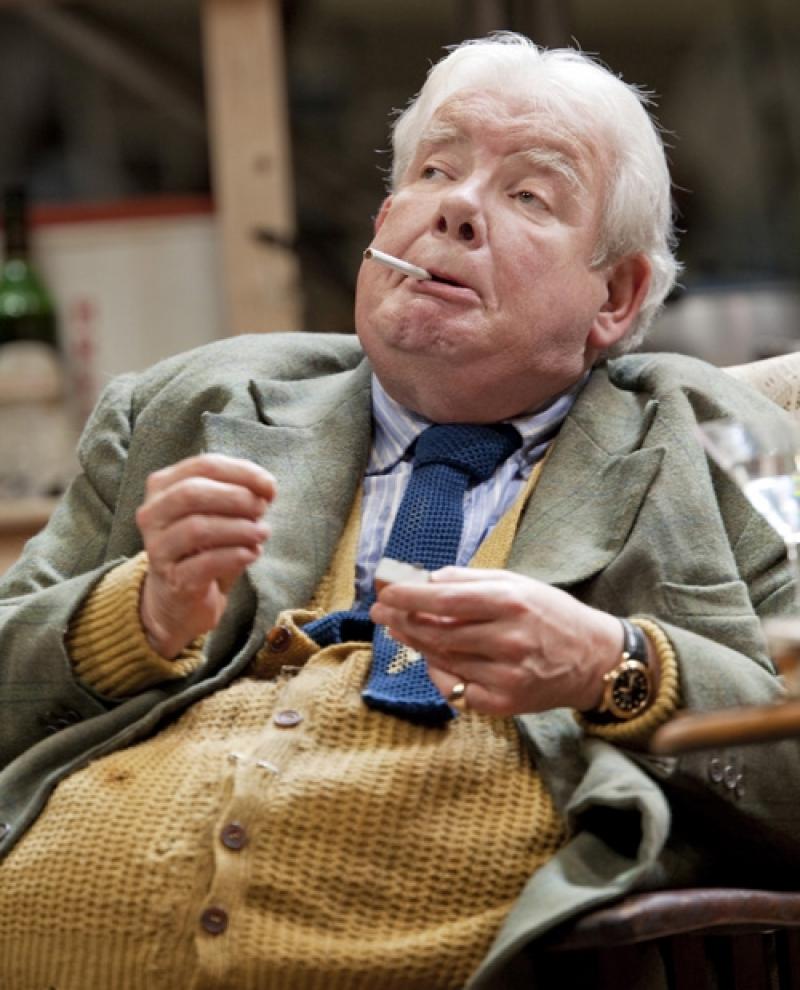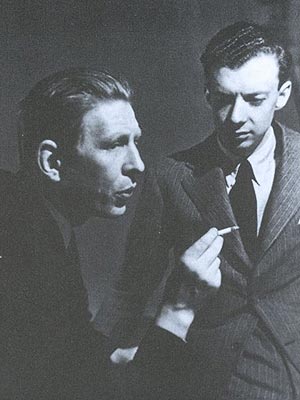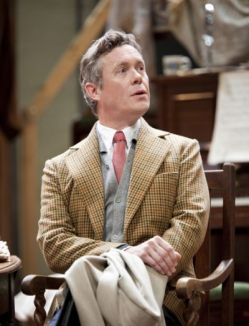The Habit of Art, National Theatre | reviews, news & interviews
The Habit of Art, National Theatre
The Habit of Art, National Theatre
Alan Bennett's new play is ribald, hilarious and secretly sympathetic

It sounded a dry subject and a dry title for Alan Bennett’s first play for five years - a fictional meeting between composer Benjamin Britten and poet W H Auden 25 years after they fell out, two old buggers, one furtive, the other extrovert. But at last night's premiere The Habit of Art proved an excruciatingly funny play, ribald, merciless, and as much about the bad habit of Theatre as that of the higher-toned Art.
Wystan Auden was “in the imperative”, as his housemaster said of him at school, an ugly, enchanting, slovenly bully. Early on he and Britten, the golden boys of British poetry and music (pictured below), collaborated on the opera Paul Bunyan and the Ballad of Heroes, but fell out when the flamboyantly queer Auden criticised Britten for being too clean, too “healthy”, too in denial of his nature. A quarter of a century later, Oxford's former Professor of Poetry has nothing to write, is bored with retelling his old successes, has gross lavatory habits, and hires rent-boys - his servants call him Professor of knobs in gobs.
 Yet The Habit of Art is so onion-layered that it prompts you to question whose Auden this is that we’re seeing - Auden’s Auden, Britten's Auden? Bennett’s Auden, the biographers’ Auden? The set-up is that a new play, called "Caliban’s Day", is being rehearsed at the National Theatre itself about Britten and Auden’s reunion in 1972, and the unimpeachable Alex Jennings and Richard Griffiths play Henry and Fitz, actors cast as the two creative giants. We swiftly gather that deep mistrust exists between the play’s Author and the Stage Manager, who is carrying out (so she glibly says) the wishes of the absent Director, who is in Leeds at a conference on Relevant Theatre, but is handily to be blamed for every alteration or indeed altercation.
Yet The Habit of Art is so onion-layered that it prompts you to question whose Auden this is that we’re seeing - Auden’s Auden, Britten's Auden? Bennett’s Auden, the biographers’ Auden? The set-up is that a new play, called "Caliban’s Day", is being rehearsed at the National Theatre itself about Britten and Auden’s reunion in 1972, and the unimpeachable Alex Jennings and Richard Griffiths play Henry and Fitz, actors cast as the two creative giants. We swiftly gather that deep mistrust exists between the play’s Author and the Stage Manager, who is carrying out (so she glibly says) the wishes of the absent Director, who is in Leeds at a conference on Relevant Theatre, but is handily to be blamed for every alteration or indeed altercation.
There is a further complication, in that within the fictional play the Author has introduced the figure of Humphrey Carpenter, the biographer of both Britten and Auden, and whose interpreter Donald (a perfectly pitched Adrian Scarborough) is the most hapless person on stage - trying to find his motivation (“My presence speaks! I am imagining you!”) but then realising, horrorstruck, “I’m only a device.”
This set-up is a masterstroke of creative procrastination, allowing for constant farcical double-takes. First we have the thoroughly enjoyable process of accustoming ourselves to Griffiths settling his vast bulk inside Bob Crowley's gross little set of a room in Christ Church, trying, without great conviction, to learn his lines and to play a grotesque with whom he has very little sympathy.
Foremost in his mind is that after this rehearsal he has a six o’clock voiceover to do for Tesco. He sarcastically enumerates his Auden props, including “my elephant urine-stained trousers, my disgusting handkerchief, my plastic bag. And have you got the mask?” This being a comical rubber Auden mask, as wrinkled as a scrotum, and no more seemly.
Fitz’s tolerance is increasingly tested by the toilet humour, a discussion about dicks that he has to have with a rent boy, and finally by an episode when Auden’s furniture starts declaiming poetry - at which Fitz quite reasonably snaps: “Do we need the talking furniture?” Oh, but we do, we do. The Talking Furniture is one of the choice display scenes for the dazzlingly funny Frances de la Tour as the Stage Manager, who is “reading” for Brian, one of the actors missing rehearsal as they are in “a Chekhov matinee”. This enables a great moment at the start of Act 2 where a man is just walking off the set (“Brian, you should go”), dressed in full Russian beard and serf costume.
 The other masterfully taut spin-off of a first half that focuses so hard on the filthy Auden is that we get to know Jennings (pictured left) in his superbly prissy actorly persona, Henry, and hence have already made up our minds to dislike Britten when the fictional meeting does finally occur. Poor Britten. He’s almost a caricature (at first), the effete, sheltered narcissist, with his affectedness, snippy envy of others, and his bragging about his OM and his chauffeur.
The other masterfully taut spin-off of a first half that focuses so hard on the filthy Auden is that we get to know Jennings (pictured left) in his superbly prissy actorly persona, Henry, and hence have already made up our minds to dislike Britten when the fictional meeting does finally occur. Poor Britten. He’s almost a caricature (at first), the effete, sheltered narcissist, with his affectedness, snippy envy of others, and his bragging about his OM and his chauffeur.
And yet Bennett wholly changes the view during the meeting. Britten has come to tell Auden about his new opera Death in Venice. Auden thinks joyfully that Britten wants him to write the libretto. But no, selfish Britten only wants Auden to support his choice of a suggestive opera subject disliked by both his partner Peter Pears and his much inferior chosen librettist, Myfanwy Piper.
Delicately, Bennett suggests in this poignantly imagined scene that Britten, for all his self-absorption, felt much more raw, insistent pain about his condition than the blatant Auden ever could, and when Auden demands that Britten stop being “furtive” about the subject of an older man desiring a boy, the gap between words and music suddenly yawns, unbridgeable. Auden jokes that he rewrites his old poems, to stop himself being embarrassed. But Britten says, with music “I have to write it before I can write it.” This is a terrific conclusion, of penetrating seriousness in all the theatrical patisserie. It's a pity that the flavoursome confection is then thoroughly sunk at the end by pouring on a sticky luvvie hommage to the noble profession of acting, and the National Theatre in particular. But perhaps that's the Director talking, back from Leeds.
Share this article
The future of Arts Journalism
You can stop theartsdesk.com closing!
We urgently need financing to survive. Our fundraising drive has thus far raised £33,000 but we need to reach £100,000 or we will be forced to close. Please contribute here: https://gofund.me/c3f6033d
And if you can forward this information to anyone who might assist, we’d be grateful.

Subscribe to theartsdesk.com
Thank you for continuing to read our work on theartsdesk.com. For unlimited access to every article in its entirety, including our archive of more than 15,000 pieces, we're asking for £5 per month or £40 per year. We feel it's a very good deal, and hope you do too.
To take a subscription now simply click here.
And if you're looking for that extra gift for a friend or family member, why not treat them to a theartsdesk.com gift subscription?
more Theatre
 Ghosts, Lyric Hammersmith Theatre - turns out, they do fuck you up
Ten years on, Gary Owen and Rachel O'Riordan top their triumphant Iphigenia in Splott
Ghosts, Lyric Hammersmith Theatre - turns out, they do fuck you up
Ten years on, Gary Owen and Rachel O'Riordan top their triumphant Iphigenia in Splott
 All the Happy Things, Soho Theatre review - deep feelings, but little drama
New play about a sibling’s death is well imagined and deeply felt, but a bit slender
All the Happy Things, Soho Theatre review - deep feelings, but little drama
New play about a sibling’s death is well imagined and deeply felt, but a bit slender
 Shanghai Dolls, Kiln Theatre review - fascinating slice of history inadequately told
Amy Ng's take on two Chinese titans needs more dramatic ballast
Shanghai Dolls, Kiln Theatre review - fascinating slice of history inadequately told
Amy Ng's take on two Chinese titans needs more dramatic ballast
 Manhunt, Royal Court review - terrifyingly toxic masculinity
After his Olivier Award win for Oedipus, Robert Icke turns to a modern “monster”
Manhunt, Royal Court review - terrifyingly toxic masculinity
After his Olivier Award win for Oedipus, Robert Icke turns to a modern “monster”
 Midnight Cowboy, Southwark Playhouse - new musical cannot escape the movie's long shadow
Two misfits misfire in misconceived show
Midnight Cowboy, Southwark Playhouse - new musical cannot escape the movie's long shadow
Two misfits misfire in misconceived show
 Thanks for Having Me, Riverside Studios review - snappily performed comedy with a lightweight core
Writer-actor Keelan Kember floods the stage with a torrent of gags but few ideas
Thanks for Having Me, Riverside Studios review - snappily performed comedy with a lightweight core
Writer-actor Keelan Kember floods the stage with a torrent of gags but few ideas
 Rhinoceros, Almeida Theatre review - joyously absurd and absurdly joyful
Ionesco classic gets an entertainingly vivid and contemporary update
Rhinoceros, Almeida Theatre review - joyously absurd and absurdly joyful
Ionesco classic gets an entertainingly vivid and contemporary update
 The Importance of Being Oscar, Jermyn Street Theatre review - Wilde, still burning bright
Alastair Whatley honours his subject in a quietly powerful performance
The Importance of Being Oscar, Jermyn Street Theatre review - Wilde, still burning bright
Alastair Whatley honours his subject in a quietly powerful performance
 Stiletto, Charing Cross Theatre review - new musical excess
Quirky, operatic show won't please everyone, but will delight many
Stiletto, Charing Cross Theatre review - new musical excess
Quirky, operatic show won't please everyone, but will delight many
 Alfred Hitchcock Presents: The Musical, Theatre Royal Bath review - not a screaming success
1950s America feels a lot like 2020s America in this portmanteau show
Alfred Hitchcock Presents: The Musical, Theatre Royal Bath review - not a screaming success
1950s America feels a lot like 2020s America in this portmanteau show
 Wilko: Love and Death and Rock'n'Roll, Southwark Playhouse review - charismatic reincarnation of a rock legend
Johnson Willis captures the anarchic energy and wit of the late guitarist
Wilko: Love and Death and Rock'n'Roll, Southwark Playhouse review - charismatic reincarnation of a rock legend
Johnson Willis captures the anarchic energy and wit of the late guitarist

Add comment